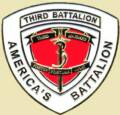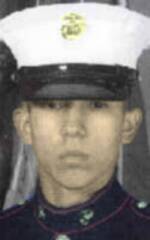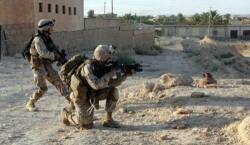Marine lieutenant exposed himself to enemy fire to save another in Iraq
Submitted by: Regimental Combat Team7
Story by: Computed Name: Sgt. Roe F. Seigle
1st Lt. Rick Posselt, a 25-year-old from Crystal River, Fla., was leading Marines and Iraqi soldiers through Haditha, Iraq, June 14, 2006, when his platoon received a barrage of enemy gunfire. Exposing himself to the enemy fire, Posselt pulled a wounded Marine – Cpl. Michael Estrella – to safety during the exchange of gunfire. On this particular patrol Marines and Iraqi soldiers were searching for a suspected insurgent when Posselt’s platoon, part of the Hawaii-based India Company, 3rd Battalion, 3rd Marine Regiment, came under sniper fire. Estrella, a 20-year-old Marine in Posselt’s platoon, was killed in the same incident. Capt. Andy Lynch, India Company’s commanding officer, says Posselt will be recognized for his brave actions on the battlefield that day. The Hawaii-based Marine battalion, also known as “America’s Battalion,” arrived in March and is scheduled to depart Iraq this fall and be replaced by another Hawaii-based unit.
HADITHA, Iraq(June 27, 2006) -- Marines here say a lieutenant who was leading Marines and Iraqi soldiers through the volatile streets of Haditha, Iraq, June 14, showed uncommon valor when he ran into a barrage of enemy gunfire to pull a wounded Marine to safety.
1st Lt. Rick Posselt, a 25-year-old from Crystal River, Fla., said he is not the Marine who deserves the recognition.
Cpl. Michael Estrella, who was killed by sniper fire during that same patrol, is the real hero and deserves the recognition, said Posselt.
The mission Posselt, a platoon commander assigned to the Hawaii-based India Company, 3rd Battalion, 3rd Marine Regiment, led the Marines and their Iraqi Army counterparts on that day was like any other – a patrol through the winding streets of Haditha. On this particular patrol they were searching for a suspected insurgent.
Haditha is a city of 30,000 nestled along the Euphrates River northwest of Baghdad in Iraq’s Al Anbar province.
When Posselt came to an intersection in a marketplace, the Marines began receiving gunfire and saw Estrella, 20, fall to the ground.
Shortly after the initial ‘cracks’ of enemy gunfire pelted the ground below and spit up shards of concrete around him, Posselt said his platoon was shot at from another direction.
Posselt’s first instinct was to get Estrella to safety – and he did so risking his own life in the process.
As the enemy gunfire continued, Posselt ran to the wounded Estrella and pulled him approximately 15 feet to safety, further exposing himself to more gunfire.
“I just did what my instinct told me to do,” said Posselt. “I was just trying to take care of my Marines.”
Looking back, Posselt feels any other Marine in his position would have done the same thing that day.
“I just happened to be the Marine closest to Estrella when he fell,” said Posselt. “I had to get him off that street and that was really the only thought going through my mind.”
With Estrella out of harm’s way, several Iraqi soldiers returned well aimed and disciplined fire to the enemy’s position, without injuring any civilians on the street that day.
Still, Posselt does not believe he is worthy of recognition, but Capt. Andy Lynch, 31, India Company’s commanding officer, says Posselt will be recognized for his brave actions on the battlefield that day.
Sgt. Jason Sakowski, 26, said he also believes Posselt is worthy of recognition.
Sakowski, one of Posselt’s squad leaders, was present during the fire fight and called in reinforcements and a medical evacuation while returning and directing fire at the enemy combatants. The enemy combatants then fled the area.
“He (Posselt) put his life on the line without even thinking about it,” said Sakowski, a 26-year-old native of Wilkesboro, N.C. “This is my third combat deployment but it is the first time I have seen bravery to that degree.”
“Muhammad,” a soldier assigned to the 2nd Battalion, 2nd Brigade, 7th Iraqi Army Division, was also present during the firefight and was one of the Iraqi soldiers who returned fire to the enemy combatants. He agrees with Sakowski – Posselt’s actions were commendable.
“He (Posselt) showed uncommon courage that day,” said Muhammad, through a translator. “He set an example for other soldiers to follow. I think he is a hero.”
Posselt gives more credit to Sakowski for his role in the fire fight than he gives himself for risking his life to pull Estrella to safety.
“Sakowski accomplished many things at once in the middle of the firefight,” said Posselt.
Sakowski called for a medical evacuation, directed fire and called in the reinforcements that arrived within a minute of being called out, said Posselt.
“Sakowski made some very important decisions under fire,” said Posselt. “He stayed calm and remembered his training in the heat of a battle.”
Posselt also said the Marines are mourning the loss of their friend and fellow warrior, Estrella, but are still focused on training the Iraqi Army to eventually provide security in this region along the Euphrates River on their own, allowing U.S. forces to eventually leave for good.
“I want to bring the rest of the Marines home safely, first and foremost,” said Posselt, right after a memorial service was held for Estrella at the Marines’ fortified base here. “But we also have to help get a government established so we do not have to come back here 10 years down the road with the same situation we had in 2003. We owe it to Estrella to accomplish the mission he came here to complete.”
The Hawaii-based Marine battalion, also known as “America’s Battalion,” arrived in March and are scheduled to depart Iraq this fall and be replaced by another Hawaii-based unit.


Note: This is not an official website. It's purpose is to support Marines of 3/3.
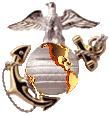
Iraq-deployed Marines develop keen eyes
for IEDs, suspected insurgents
Regimental Combat Team7
Story by: Sgt. Roe F. Seigle
HAQLANIYAH, Iraq(June 9, 2006) -- Marines operating in this insurgent-heavy Euphrates Valley city have developed a knack for locating improvised explosive devices – seemingly the number one weapon of choice of insurgents in Al Anbar Province.
According to Cpl. Robert Gaye, a squad leader assigned to the Hawaii-based 3rd Battalion, 3rd Marine Regiment, the Marines are also getting a little help from the local populace in finding IEDs before they are able to do harm to innocent civilians or Coalition Forces.
Everyday Marines and Iraqi soldiers conduct counter insurgency/security patrols in the volatile streets of Haqlaniyah, a city of 30,000 nestled along the Euphrates River Northwest of Baghdad ever watchful for signs that an IED has been placed by an insurgent.
During these patrols, in temperatures surpassing 110 degrees, Gaye says the Marines and Iraqi soldiers are sending out a strong message – insurgency and hostile acts towards Coalition Forces will not be tolerated.
Gaye said he thinks the local populace is beginning to get the message.
Recently, Marines from the Hawaii-based Kilo Company, 3rd Battalion, 3rd Marine Regiment discovered the location of an improvised explosive device placed by insurgents on a highly-traveled roadway May 30, 2006.
While the Marines were enroute to the location, military helicopters spotted two more insurgents placing another IED on the same roadway only kilometers away. The Marines cordoned off the area around both of the IEDs to prevent vehicles and pedestrians from entering the area.
One of the roadside bombs was detonated in place by a U.S. Navy explosive ordinance disposal team, without damaging any nearby houses or military equipment. The second IED was disabled without detonation.
“I think the citizens here are beginning to realize that we are not the enemy and want to cooperate with us,” said Gaye, 23, a squad leader assigned to Kilo Company after returning from a patrol through the streets of Haqlaniyah.
Still, IEDs have accounted for about 50 percent of all U.S. fatalities in Iraq, according to the Iraq Coalition Casualty Count – an organization which tallies U.S. and Coalition casualties based off Department of Defense press releases.
However, the Marines from Kilo Company are not being deterred by the threat IEDs pose, said Gaye, a native of Trafford, Pa.
“Looking for signs of an IED…has become second nature to a lot of the Marines,” said Gaye, who is a veteran of Operation Enduring Freedom in Afghanistan and has had six personal experiences with IEDs. He saw one explode on a roadway in March, the month Kilo Company arrived in Haqlaniyah and assumed control of the battle space. He said no Marines were injured because of the amount of protective armor put on the military vehicles.
“When an IED explodes, you do not have time to get scared,” said Gaye. “Your first thought is you hope none of the Marines got hurt.”
The Marines are developing a keen eye for suspicious individuals. While the Marines were waiting for the explosive ordinance disposal unit to arrive and detonate the IEDs, Gaye and a few of his Marines noticed two men wandering around the area Marines had already cordoned off. Gaye’s instinct told him the men were up to no good, he said.
Gaye and his Marines ordered the men to stop and conducted a pat-search on both the men. Gaye’s suspicions of the men were confirmed when they found large sums of both American and Iraqi Currency, and multiple ID cards on them, among other objects, which cannot be identified in this article due to concerns of operational security. Both were detained and taken to a detention facility for further questioning.
According to 1st Sgt. Vincent Santiago, Kilo Company’s senior advisor and a native of Merizo, Guam, the Marines have discovered more than 20 undetonated IEDs – bombs which could have harmed or killed U.S. and Iraqi troops, as well as Iraqi civilians.
“They use IEDs because they do not have the courage to stand and fight the Marines face-face-face,” said Santiago, 36. “A squad of Marines in Kilo Company could take out all the insurgents in the city in a face-to-face fight.”
However, Santiago said the threat of a small-arms attack is still present. Last month, Marines from Kilo Company engaged in fire fights with several insurgents who embedded themselves in an abandoned hotel. The Marines held their ground and surrounded the hotel until a U.S. military air strike partially leveled the building. Further air strikes destroyed the building altogether and eliminated the insurgents inside.
Marine leaders like Gaye, who lead Marines in patrols through the unpredictable and winding streets of Haqlaniyah, believe their Marines are handling the stress of possible IED attacks and small-arms fire quite well.
“What the insurgents do not realize is the more they fight us, the more motivated the Marines are to fight them back,” said Gaye. “The stress turns into determination on the battlefield.”
The Marines have been able to spot individuals in populated areas – such as marketplaces – who appear suspicious. Usually, it is just the looks on the individual’s face that appears suspicious.
More times than not, Gaye said, their suspicions are confirmed when they search the individuals and find contraband on them, such as fake ID cards and anti-Coalition Forces propaganda. These simple observations, Gaye believes, can save lives and get insurgents off the streets of Haqlaniyah.
Sgt. Mennen Suleiman, a squad leader assigned to Kilo Company, couldn’t agree more.
“We are (detaining insurgents) almost everyday, who might be involved with or assisting in attacks against us,” said Suleiman, a native of Kearney, Neb. Suleiman speaks fluent Arabic and lived in Kirkut, Iraq, until he was 12. He uses his language skills to encourage residents to report attacks before they happen and report individuals who are responsible for the planning and execution of attacks against Marines.
“Marines have been able to see many IEDs up close and personal after we removed and disabled them,” said Gaye. “They know what to look for now and Marines are on the alert. This is what is going to save lives out here.”
Photos included with story: Sgt. Mennen Suleiman, a squad leader assigned to the Hawaii-based Kilo Company, 3rd Battalion, 3rd Marine Regiment, sifts through a blast site from an improvised explosive device to look for evidence of the type of munitions used in the roadside bomb, May 30, 2006. Marines operating in the insurgent-heavy Euphrates Valley have developed a knack for locating improvised explosive devices – seemingly the number one weapon of choice of insurgents in Al Anbar Province. Shortly after the Marines found the IED, military helicopters spotted two more insurgents placing another IED on the same roadway only kilometers away. Both men were detained. Everyday Marines and Iraqi soldiers patrol the volatile streets of Haqlaniyah, a city of 30,000 nestled along the Euphrates River Northwest of Baghdad. The Marines say they are sending out a strong message to insurgents – hostile acts towards Coalition Forces will not be tolerated. Photo by: Sgt. Roe F. Seigle
--------------------------------------------------------------------------------
Marines operating in the insurgent-heavy Euphrates Valley have developed a knack for locating improvised explosive devices – seemingly the number one weapon of choice of insurgents in Al Anbar Province. Shortly after the Marines found the IED, military helicopters spotted two more insurgents placing another IED on the same roadway only kilometers away. Both men were detained. Everyday Marines and Iraqi soldiers patrol the volatile streets of Haqlaniyah, a city of 30,000 nestled along the Euphrates River Northwest of Baghdad. Here, a suspected insurgent is escorted by a U.S. Marine from the Hawaii-based Kilo Company, 3rd Battalion, 3rd Marine Regiment, from a U.S. military seven-ton truck to a nearby detention facility under suspicion of planting an IED on a roadway traveled by Coalition Forces and Iraqis. The Marines say they are sending out a strong message to insurgents – hostile acts towards Coalition Forces will not be tolerated. Photo by: Sgt. Roe F. Seigle
--------------------------------------------------------------------------------
A deafening ‘boom’ and rising cloud of black smoke are the remnants of the explosion caused by a roadside bomb, which U.S. Marines found May 30, 2006, during a patrol in Haqlaniyah, Iraq, a city of 30,000 nestled along the Euphrates River Northwest of Baghdad. Marines operating in the insurgent-heavy Euphrates Valley have developed a knack for locating improvised explosive devices – seemingly the number one weapon of choice of insurgents in Al Anbar Province. Shortly after the Marines found the IED, military helicopters spotted two more insurgents placing another IED on the same roadway only kilometers away. Both men were detained. Everyday Marines and Iraqi soldiers patrol the volatile streets of Haqlaniyah. An Explosive Ordinance Disposal team detonated the roadside bomb to prevent it from doing harm to anyone traveling the road. The Marines say they are sending out a strong message to insurgents – hostile acts towards Coalition Forces will not be tolerated. Photo by: Sgt. Roe F. Seigle
--------------------------------------------------------------------------------
A U.S. Marine from the Hawaii-based Kilo Company, 3rd Battalion, 3rd Marine Regiment, shows a piece of shrapnel left behind from an improvised explosive device, which the Marines found May 30, 2006, in Haqlaniyah, Iraq. An Explosive Ordinance Disposal team detonated the roadside bomb to prevent it from doing harm to anyone traveling the road. Marines operating in the insurgent-heavy Euphrates Valley have developed a knack for locating improvised explosive devices – seemingly the number one weapon of choice of insurgents in Al Anbar Province. Shortly after the Marines found the IED, military helicopters spotted two more insurgents placing another IED on the same roadway only kilometers away. Both men were detained. Everyday Marines and Iraqi soldiers patrol the volatile streets of Haqlaniyah, a city of 30,000 nestled along the Euphrates River Northwest of Baghdad. IEDs have accounted for about 50 percent of all U.S. fatalities in Iraq, according to the Iraq Coalition Casualty Count – an organization which tallies U.S. and Coalition casualties based off Department of Defense press releases. Photo by: Sgt. Roe F. Seigle
--------------------------------------------------------------------------------
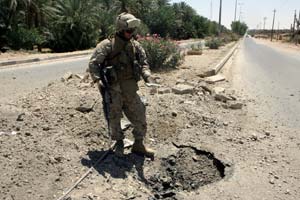
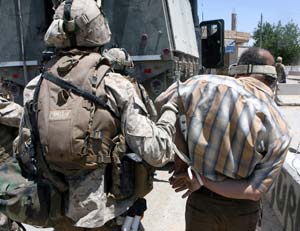
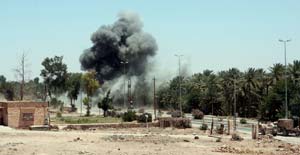
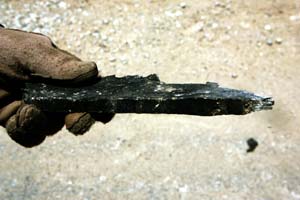
KIA Marine is 2,500th lost in Iraq
[source: Navy Times]
Marine Cpl. Michael A. Estrella, 20, of Hemet, Calif.;
assigned to 3rd Battalion, 3rd Marine Regiment,
3rd Marine Division, III Marine Expeditionary Force,
Marine Corps Base Kaneohe Bay, Hawaii
was killed June in Anbar province, Iraq. —
The 2,500th member of the U.S. armed forces killed since the war in Iraq began is a Marine from California, the Defense Department announced today.
Cpl. Michael Estrella, of Hemet, was killed June 14 during combat operations in Anbar Province, Iraq, the Defense Department said.
2nd Lt. Binford Strickland, spokesman for the Marine Corps Base in Kaneohe Bay, Hawaii, where Estrella’s unit is based, said that Estrella is the 2,500th military member killed since the invasion of Iraq. Casualty officials at Marines Corps Headquarters in Washington, D.C., confirmed Strickland’s statement.
A field radio operator by military specialty, Estrella was assigned to India Company, 3rd Battalion, 3rd Marines, at the time of his death. His unit has been in Iraq since March.
Estrella was on his second combat deployment when he was killed. He was with 3/3 when it deployed to Afghanistan in November 2005 and returned to Hawaii in June 2005, Strickland said.
The U.S. suffered its 2,000th casualty in late October, when statistical data showed that more than half of the fallen were under age 25.
Estrella, at 20, had already earned the Combat Action Ribbon, National Defense Medal, Afghanistan and Iraq Campaign Medals, and the Global War on Terrorism Service Medal at the time of his death. Stickland said a recommendation to award him the Purple Heart has also been submitted, but it has not yet made it through the administrative process of being approved.
By John Hoellwarth Navy Times staff writer
Photos included with story: 1st Lt. Rick Posselt, a 25-year-old from Crystal River, Fla., was leading Marines and Iraqi soldiers through Haditha, Iraq, June 14, 2006, when his platoon received a barrage of enemy gunfire. Exposing himself to the enemy fire, Posselt pulled a wounded Marine – Cpl. Michael Estrella – to safety during the exchange of gunfire. On this particular patrol Marines and Iraqi soldiers were searching for a suspected insurgent when Posselt’s platoon, part of the Hawaii-based India Company, 3rd Battalion, 3rd Marine Regiment, came under sniper fire. Estrella, a 20-year-old Marine in Posselt’s platoon, was killed in the same incident. Capt. Andy Lynch, India Company’s commanding officer, says Posselt will be recognized for his brave actions on the battlefield that day. The Hawaii-based Marine battalion, also known as “America’s Battalion,” arrived in March and is scheduled to depart Iraq this fall and be replaced by another Hawaii-based unit. Photo by: Cpl. Antonio Rosas
-----------------------------------------------------------------------------
Marines assigned to the Hawaii-based 3rd Battalion, 3rd Marine Regiment climb a hill during a patrol in Haditha, Iraq, June 25, 2006. 1st Lt. Rick Posselt, a 25-year-old from Crystal River, Fla., was leading Marines and Iraqi soldiers through Haditha, June 14, on a similar patrol when his platoon came under attack. Posselt put his life in danger when he ran into enemy gunfire to pull a wounded Marine, Cpl. Michael Estrella, to safety. Estrella later died of his wounds. Capt. Andy Lynch, India Company’s commanding officer, says Posselt will be recognized for his brave actions on the battlefield that day. The Hawaii-based Marine battalion, also known as “America’s Battalion,” arrived in March and is scheduled to depart Iraq this fall and be replaced by another Hawaii-based unit. Photo by: Cpl. Antonio Rosas
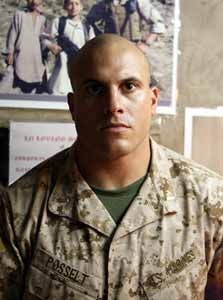
Click picture to enlarge
